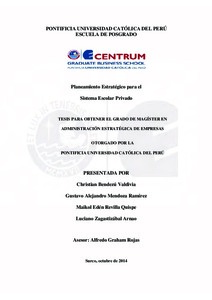| dc.contributor.advisor | Graham Rojas, Alfredo | |
| dc.contributor.author | Bendezú Valdivia, Christian | |
| dc.contributor.author | Mendoza Ramírez, Gustavo Alejandro | |
| dc.contributor.author | Revilla Quispe, Maikol Edén | |
| dc.contributor.author | Zagastizábal Arnao, Luciano | |
| dc.date.accessioned | 2019-05-17T21:07:22Z | |
| dc.date.available | 2019-05-17T21:07:22Z | |
| dc.date.created | 2014-10 | |
| dc.date.issued | 2019-05-17 | |
| dc.identifier.uri | http://hdl.handle.net/20.500.12404/14218 | |
| dc.description.abstract | La educación es uno de los pilares fundamentales para acompañar el crecimiento del
país. El sistema educativo escolar en el Perú no es competitivo, y los resultados
internacionales así lo demuestran, tanto para el sistema público como para el sistema privado.
En el caso del Sistema Escolar Privado, son pocas las instituciones que dan una educación de
calidad y son muchas las brechas existentes entre sus instituciones, si bien la educación
privada en el Perú, es percibida por la población como Instituciones con mejor calidad
educativa que el sistema escolar público, la realidad es que se encuentran muchas deficiencias
al interior del sistema.
En base a lo anterior el presente documento trabaja íntegramente el
Planeamiento Estratégico para el Sistema Escolar Privado, el mismo que se ha trabajado bajo
el modelo secuencial del proceso estratégico. En cada capítulo se encontraran los diferentes
entregables que exige cada fase del modelo: Formulación y Planeamiento, Implementación y
Dirección, Evaluación y Control; con todos estas fases desarrolladas, se tendrán las
conclusiones y recomendaciones que permitirán crear las ventajas competitivas, de tal manera
puedan llevar al Sistema Escolar Privado a una posición privilegiada en la región
Latinoamérica y el Caribe en cuanto a resultados y nivel educativo.
Los objetivos a largo plazo como consecuencia de los análisis externo e interno
del Sistema Escolar Privado apuntan a desarrollar una propuesta educativa de calidad para
todo el sistema, para ello las estrategias establecidas están orientadas a la estandarización y
fiscalización de los servicios educativos al interior del sistema. Una educación de calidad
debe potenciar el desarrollo de las competencias y habilidades, así como, las capacidades
cognitivas, sociales, afectivas y morales de los estudiantes, debe preocuparse también por
promover el desarrollo profesional y continuo de los docentes, y debe contribuir a la
participación de los padres de familia y a la satisfacción de la comunidad en general. | es_ES |
| dc.description.abstract | Education is one of the fundamental props to accompany the growth of the country.
The educational school system in Peru is not competitive, and the international results like
that demonstrate it, both for the public system and for the private system. In case of the
School Private System, are small institutions that give a qualified education and the existing
gaps are still great in between this institutions, though the private education in Peru is
perceived by the population as Institutions with better educational quality that the School
Public System, the reality is that they find many deficiencies to the interior of the system.
Based on the above mentioned, this document works entirely the Strategic Planning for the
School Private System, the same one that one that has been worked under the sequential
model of the strategic process.
In every chapter you will find the different deliverable ones for every phase that the
model demands: Formulation and Planning, Implementation and Direction, Evaluation and
Control; with all these phases developed, conclusions and recommendations that allow to
create the competitive advantages in such a way that could lead the School Private System to
a privilege position in the Latin America and the Caribbean Region regarding the results and
educational level.
The long-term objectives as consequence of the analyses of the inside and outside of
the School Private System remark to develop an educational offer of quality for the whole
system that for the established strategies are orientated to the standardization and overlooking
of the educational services to the interior of the system.
A qualified education must promote the development of the competitions and skills, as
well as, the cognitive, social, affective and moral capacities of the students, must worry also
for promoting the professional and constant development of the teachers, and must contribute
to the participation of the family parents and to the satisfaction of the community in general. | es_ES |
| dc.language.iso | spa | es_ES |
| dc.publisher | Pontificia Universidad Católica del Perú | es_ES |
| dc.rights | info:eu-repo/semantics/openAccess | es_ES |
| dc.rights.uri | http://creativecommons.org/licenses/by-nc-nd/2.5/pe/ | * |
| dc.subject | Educación--Perú | es_ES |
| dc.subject | Planificación estratégica | es_ES |
| dc.title | Planeamiento estratégico para el sistema escolar privado | es_ES |
| dc.type | info:eu-repo/semantics/masterThesis | es_ES |
| thesis.degree.name | Maestro en Administración Estratégica de Empresas | es_ES |
| thesis.degree.level | Maestría | es_ES |
| thesis.degree.grantor | Pontificia Universidad Católica del Perú. CENTRUM | es_ES |
| thesis.degree.discipline | Administración Estratégica de Empresas | es_ES |
| renati.advisor.dni | 42446831 | |
| renati.author.dni | 40900573 | |
| renati.author.dni | 07268884 | |
| renati.author.dni | 41600091 | |
| renati.author.dni | 09873012 | |
| renati.discipline | 413307 | es_ES |
| renati.level | https://purl.org/pe-repo/renati/level#maestro | es_ES |
| renati.type | https://purl.org/pe-repo/renati/type#tesis | es_ES |
| dc.publisher.country | PE | es_ES |
| dc.subject.ocde | https://purl.org/pe-repo/ocde/ford#5.02.04 | es_ES |






